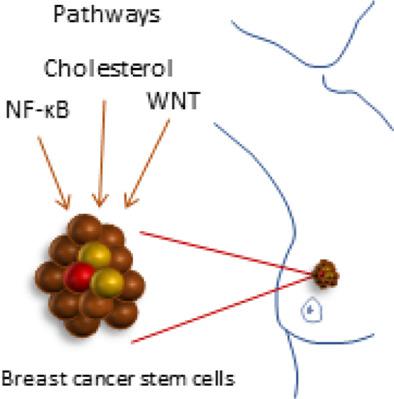当前位置:
X-MOL 学术
›
STEM CELLS
›
论文详情
Our official English website, www.x-mol.net, welcomes your
feedback! (Note: you will need to create a separate account there.)
Signaling pathways essential for triple-negative breast cancer stem-like cells
STEM CELLS ( IF 4.0 ) Pub Date : 2020-12-08 , DOI: 10.1002/stem.3301 Sidse Ehmsen 1, 2, 3, 4 , Henrik J Ditzel 1, 2, 3, 4
STEM CELLS ( IF 4.0 ) Pub Date : 2020-12-08 , DOI: 10.1002/stem.3301 Sidse Ehmsen 1, 2, 3, 4 , Henrik J Ditzel 1, 2, 3, 4
Affiliation

|
Since the discovery of breast cancer stem cells (CSCs), a significant effort has been made to identify and characterize these cells. It is a generally believe that CSCs play an important role in cancer initiation, therapy-resistance and progression of triple-negative breast cancer (TNBC), an aggressive breast cancer subtype with poor prognosis. Thus, therapies targeting these cells would be a valuable addition to standard treatments that primarily target more differentiated, rapidly dividing TNBC cells. Although several cell surface and intracellular proteins have been described as biomarkers for CSCs, none of these are specific to this population of cells. Recent research is moving towards cellular signaling pathways as targets and biomarkers for CSCs. The WNT pathway, the NF-κB pathway and the cholesterol biosynthesis pathway have recently been identified to play a key role in proliferation, survival and differentiation of CSCs, including those of breast cancer. In this review, we assess recent findings related to these three pathways in breast CSC, with particular focus on TNBC CSCs, and discuss how targeting these pathways, in combination with current standard of care, might prove effective and improve the prognosis of TNBC patients. © AlphaMed Press 2020 SIGNIFICANCE STATEMENT: Breast cancer stem cells (CSCs) or tumor-initiating cells are thought to play an important role in tumor development, therapy resistance and progression of triple-negative breast cancer (TNBC). To overcome the poor prognosis of TNBC, novel therapies targeting CSCs need to be developed. Research has moved from single surface proteins as biomarkers and targets for CSCs towards signaling pathways essential for the tumor-initiating ability and therapy resistance of CSCs. This review provides a concise overview on the current knowledge of three key pathways, WNT, NF-κB and cholesterol biosynthesis, important for proliferation and survival of breast CSCs.
中文翻译:

三阴性乳腺癌干细胞样细胞必不可少的信号通路
自从发现乳腺癌干细胞 (CSC) 以来,已经做出了重大努力来识别和表征这些细胞。人们普遍认为,CSC 在三阴性乳腺癌 (TNBC) 的癌症发生、治疗抵抗和进展中起重要作用,三阴性乳腺癌是一种预后不良的侵袭性乳腺癌亚型。因此,针对这些细胞的疗法将是对主要针对分化程度更高、分裂速度更快的 TNBC 细胞的标准治疗的宝贵补充。尽管有几种细胞表面和细胞内蛋白被描述为 CSC 的生物标志物,但这些都不是该细胞群所特有的。最近的研究正朝着将细胞信号通路作为 CSC 的靶标和生物标志物的方向发展。WNT途径,最近已确定 NF-κB 途径和胆固醇生物合成途径在 CSCs(包括乳腺癌)的增殖、存活和分化中起关键作用。在这篇综述中,我们评估了最近与乳腺 CSC 中这三种通路相关的发现,特别关注 TNBC CSC,并讨论了如何靶向这些通路,结合当前的护理标准,可能证明有效并改善 TNBC 患者的预后。© AlphaMed Press 2020 意义声明:乳腺癌干细胞 (CSC) 或肿瘤起始细胞被认为在三阴性乳腺癌 (TNBC) 的肿瘤发展、治疗抵抗和进展中发挥重要作用。为了克服 TNBC 的不良预后,需要开发针对 CSC 的新疗法。研究已经从作为 CSCs 的生物标志物和靶点的单一表面蛋白转向对 CSCs 的肿瘤启动能力和治疗抗性至关重要的信号通路。本综述简要概述了三个关键途径的当前知识,WNT、NF-κB 和胆固醇生物合成,对乳腺 CSC 的增殖和存活很重要。
更新日期:2020-12-08
中文翻译:

三阴性乳腺癌干细胞样细胞必不可少的信号通路
自从发现乳腺癌干细胞 (CSC) 以来,已经做出了重大努力来识别和表征这些细胞。人们普遍认为,CSC 在三阴性乳腺癌 (TNBC) 的癌症发生、治疗抵抗和进展中起重要作用,三阴性乳腺癌是一种预后不良的侵袭性乳腺癌亚型。因此,针对这些细胞的疗法将是对主要针对分化程度更高、分裂速度更快的 TNBC 细胞的标准治疗的宝贵补充。尽管有几种细胞表面和细胞内蛋白被描述为 CSC 的生物标志物,但这些都不是该细胞群所特有的。最近的研究正朝着将细胞信号通路作为 CSC 的靶标和生物标志物的方向发展。WNT途径,最近已确定 NF-κB 途径和胆固醇生物合成途径在 CSCs(包括乳腺癌)的增殖、存活和分化中起关键作用。在这篇综述中,我们评估了最近与乳腺 CSC 中这三种通路相关的发现,特别关注 TNBC CSC,并讨论了如何靶向这些通路,结合当前的护理标准,可能证明有效并改善 TNBC 患者的预后。© AlphaMed Press 2020 意义声明:乳腺癌干细胞 (CSC) 或肿瘤起始细胞被认为在三阴性乳腺癌 (TNBC) 的肿瘤发展、治疗抵抗和进展中发挥重要作用。为了克服 TNBC 的不良预后,需要开发针对 CSC 的新疗法。研究已经从作为 CSCs 的生物标志物和靶点的单一表面蛋白转向对 CSCs 的肿瘤启动能力和治疗抗性至关重要的信号通路。本综述简要概述了三个关键途径的当前知识,WNT、NF-κB 和胆固醇生物合成,对乳腺 CSC 的增殖和存活很重要。











































 京公网安备 11010802027423号
京公网安备 11010802027423号